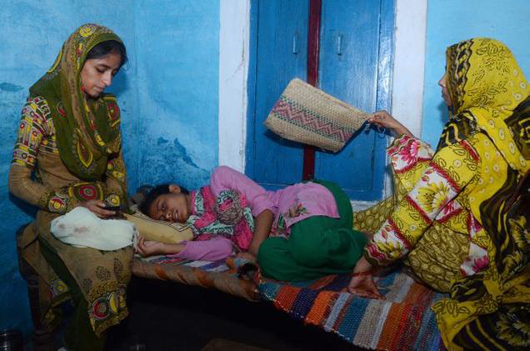Greater Noida, Oct 3: Delhi Chief Minister Arvind Kejriwal and some local Congress leaders were today stopped from entering Bishada village to meet family of a man lynched for allegedly eating beef after villagers upset over a steady stream of visitors pelted stones at media persons.

Daughter (C) of the victim who was killed in the violence at Bishara village in Dadri.
Police said the situation in the village had turned tense as women in the village had objected to presence of media and some persons had pelted stones at them.
In view of the protests, entry to visitors was stopped and the administration was trying to pacify the agitated villagers, police said.
"Once the situation becomes normal, visitors will be allowed entry," they said.
Peeved at being stopped outside the village, Kejriwal, who was accompanied by some party leaders, questioned whey he was stopped from meeting the family when leaders like Asaduddin Owaisi and Mahesh Sharma were allowed.
"We r stopped by police n admn. Mahesh Sharma n Owaisi not stopped yest. Then y me? I am most peace loving. Want 2 jst meet Ikhlak's family," he tweeted.
AAP leaders claimed that police and administration officials stopped them and not villagers. Administration officials later took Kejriwal to NTPC guest house.
A state Congress delegation led by Siraj Mehandi was also not allowed entry to Bishada village today.
The district administration said they have sealed the village as victim's son has appealed that they want peace in their hour of grief.
District Magistrate N P Singh had yesterday said that the victim's son Sartaj had given a written request that the family does not want to meet anyone as continuous stream of visitors were causing harassment to them.
He had said that questions were raised as to why the administration had not stopped the entry of visitors. He had said that though he believed in transparency, the visitors were trying to "communalise" the issue which was a matter of concern.
Yesterday, AIMIM leader Asaduddin Owaisi had visited Bishada village to console victim Mohammed Iqlakh's family and had questioned the Prime Minister's silence on the "pre-planned murder".
Owaisi had rubbished claims that Iqlakh's family was attacked because of rumours that it had eaten beef and alleged he was done to death because of his religious persuasion.
"This attack was not because of meat. The SP government, instead of arresting the murderers, is getting a forensic test done on the meat found at the victim's home. Their mind, which is full of poison, should be examined first. They are treating the victim as accused," he had said.
Mahesh Sharma, the local BJP MP, had also visited the bereaved family yesterday. He stated that the killing was an "accident" which should not be given a communal colour and over which no politics should be done as it may prove to be "dangerous".
Contingents of Provincial Armed Constabulary and state police have been deployed across the village where prohibitory orders banning assembly of five or more people continued to be in force.
Meanwhile, the District Magistrate said the condition of Iqlakh's 22-year-old son Danish, who was critically wounded during the assault, was improving. He said the victim's family members were satisfied with treatment at hospital.





Comments
Add new comment